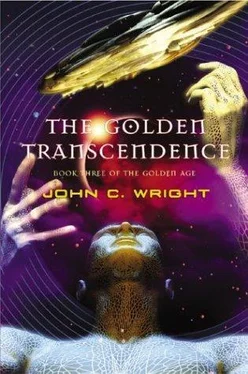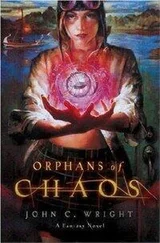The sky above was blue and fine, clean of any cloud or speck, and the man wept. This member of the Eleemosynary, a thin big-eyed girl, sat for a time next to the him, her arm around his shoulder, saying nothing.
Kshatrimanyu Han woke and devastened in his gold coffin in the midst of the Aurelian Palace-city. As the Speaker of the Parliament, and the advising programmer of the Shadow Parliament, it was he who presided over the many melancholy ceremonies and closing rituals of the Month of Fasting. There were no more entertainments, no parades, no public spectacles. Even during this brief period, he reminded his fellow parlimentarians of the decision, or prediction of the Transcendence.
The Parliament resurrected an ancient custom. In august service held on the deck of the Fourth Era warship Union, the Parliament issued Marshal Atkins a medal of the Order of the Commonwealth High Honor, not just for his actions during the fighting itself, but, more so, for his persistence, all those long years, in maintaining himself in battle readiness, when so many told him so fiercely that he was no longer needed, or wanted.
This was accompanied by a brevet increase in rank (though not an increase in pay).
During the Month of Delayed Forgetting, many Alternative Organizations, whose odd arrangements of consciousness allowed them, without great pain, to recall and to forget inexpressible events from higher states of consciousness, returned to quotidian mind state before the Basics or Invariants.
In his many-warded coven-cells, Ao Aoen woke, and diminished himself, using an antique ritual of the anti-Buddha, called the intricate and entangling robe of the Illusion of Maya. In mediation, one thread at a time, he rewove the robe in his mind, and rewove his mind into the normal life he had known and forgotten. Thoughts from the Transcendace too bright and fierce for him to keep, in his imagination, he turned into butterflies of fire, and sent them to whirl around his chamber of visualizations.
Taking up his athame knife, he cut the palm of the body he wore, and caught the drops of blood he shed and gathered them into an envelope, which he had familiar carry through the real world to the center of the Wolf-mind coven. This coven was one of the few Warlock groups who had always been loyal to Atkins, and who had contributed regularly to his upkeep. Hitherto, they had been obscure, and shunned. No longer.
Warlocks themselves, they recognized this meaning of the blood-gift for what it was: a pledge of loyalty from Ao Aoen.
The Wolf-minds crawled on all fours and howled toward the cities on the moon; the branch of their order on the moon cried out at the blue Earth motionless in the high pressurized windows of the Lunar cities. They celebrated the offer of Ao Aoen.
During the Month of Self-Reacquaintance (which the Black Manorials jokingly called Getting Used to Being Stupid Again), Ao Aoen and the Warlocks of the Wolf-mind School had already unleashed onto a thousand channels ten thousand dreams, poems, spells, and thought formulations; the theme in each poem, whether obvious or hidden, was the same: war was coming.
The Lacedaimonians of the Dark-Gray Manor woke in their coffins in their manor houses. They encountered the dreams of the wolves, and posted several of the brief, grim slogans or sayings for which their house was famed. The intention was clear: the Dark-Gray publicly supported Ao Aeon's reform movement to restore the military to its place of proper respect in the public eye. Temer Lacedaimon of the Dark-Gray issued a fractal recursive haiku, of the type that generated additional meaning when subjected to additional levels of analysis. The surface meaning of the poem was clear, however: Atkins was praised as the savior of the Oecumene. The Dark-Gray cherished and applauded the killings he had done as utterly justified. Meanwhile, Warlocks and Wolves applauded the Dark-Gray, heaped disbelief, scorn, and outrage on any persons who dared say otherwise.
Ao Aoen announced that the Wolves would throw Atkins a ticker-tape parade, as some of the very earliest motion pictures depicted. New Chicago was chosen as the site, and ticker tape mingled with the falling snow.
During this parade, others (most noticeably the Harmonious Composition, and the non-Invariants of the Lotos-Eaters School) protested, and indulged in loud and dramatic displays of disfavor, flying hundred-kilometer-long banners from low orbit, buying dream-time beneath the parade, in order to sway public opinion against Atkins, and against the war in general. These protesters argued along the public channels that any future that glorified the profession of arms would coarsen the sensibilities of the public, and reintroduce into moral debate the dangerous notion of ends justifying means.
Many critics published the opinions that the solemn fasts and re-sequencings normally held during this month had been marred by the acrimony of these debates.
In truth, the devastenings had not been completely harmonious. Both sides remembered that the Transcendence had affirmed their positions, and not then-opponents.
Nebuchadnezzar Sophotech remained in Transcendence longer than did the less complex computer personalities of Socrates of Athens Sixty-sixth Partial Historical Extrapolation Dependent Machine-mind, and Emphyrio of Ambroy One Partial Fictional Extrapolation (Status-in-review) Semi-independent When Neo-Orpheus (whose habit was to abolish his body during Transcendency periods) came, dripping, out of the bioreconstruction tub, into the plain, unadorned palace of black stone where he dwelled, instantiations of both these Hortators were awaiting him, and Nebuchadnezzar was nowhere around to advise them.
Socrates was seated on the plain black stairs before the blank door of Orpheus Palace, drawing circles and right triangles in the snow that had gathered in the courtyard and smiling to himself. Bean juice from a meal (either a real meal or an unusually good repro) still stained the philosopher's beard.
Emphyrio was wearing a black shipsuit with an energy-cloak of silvery solar-cell tissue. He stood with his arms crossed and his legs spread, his head held high, a grim light in his eye. He examined the blank and windowless walls of Orpheus Palace with the expression of a poliocratist thinking how to knock down or storm the walls of a castle. Snowy gusts tossed the cloak behind him.
Neo-Orpheus, as was his habit when masquerades were over, went nude, and merely adjusted his body against the change in temperature when he stepped out of doors.
They spoke in rapid electronic pulses, mind-to-mind. The niceties of speaking aloud and slowly, after the fashion of his ancestors, had been left behind with the other frivolities of the late masquerade.
Neo-Orpheus did not header his information packages with normal address-response codes. He expected everyone to whom he spoke to know who and what he was. In the protocols of electronic mind-speech, this was a brusque, perhaps even a rude, conceit. But he was, or he had been, after all, Orpheus, the man who granted immortality to man.
Brusquely, then: "What's wrong? Why do you come in person?"
Socrates answered without looking up: "The press and clamor of many busy folk along the land lines, still filled with post-Transcendence business, precludes us from sending through messengers our burden. Like donkeys laden, we come, carrying what few fragments of the dream we still recall from our voyage to the higher realm of forms."
Neo-Orpheus said, "The Recollections were done in a more haphazard fashion than ever has been before: the gathered totality was distraught. Much was lost. What do you recall?"
There was a pause as circuits in the high black walls absorbed the memory load from the two Hortators. Without a Sophotech, it could not be indexed or absorbed by Neo-Orpheus, without further slow-rate exchanges needed to orient him to the subject matter. It was the way memory works: nothing comes to mind until one is reminded. So the "speech" of the three Hortators continued.
Читать дальше










